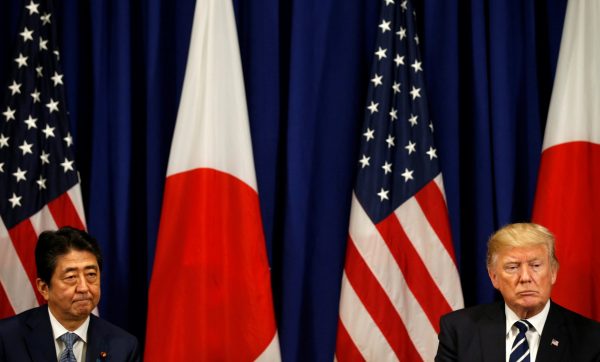On foreign and security policy there are three vital issues to consider: North Korea, Russia and China.
North Korea’s determination to possess nuclear weapons combined with increasing US demonstrations of power in the region and President Trump’s harsh rhetoric risks sparking possible skirmishes between the United States and North Korea. Escalation could lead to total war — a result which would result in unimaginable damage to the countries in the region. Seoul would be subject to massive artillery attacks. Japan may also be subjected to massive short-range missile attacks, some with nuclear warheads, targeting not only Japanese and US military bases but also nuclear power plants and large cities, a disaster far more serious than what Japan had to bear in the Pacific War.
It is the paramount responsibility of a Japanese prime minister not to let this happen.
The way to achieve this is through first confidential and then open dialogue with North Korea. This may give minimal satisfaction to both Pyongyang and Washington who are the two real negotiators in the present conflict: Pyongyang must give direct assurance to Washington of a freeze on its nuclear program under an international inspection regime in return for Washington’s guarantee not to threaten the regime in Pyongyang.
The time has come for Abe to mobilise his potential negotiating power, accumulated through his unwavering assertions that ‘now it is time for pressuring’.
Abe is uniquely able to explain to President Trump Japan’s own experiences in World War II, many of which recommend a path of negotiation. Abe can explain that Washington’s pressure and embargo of Japan’s oil supply influenced its subsequent attack against the United States, and can explain that Washington’s understanding of the necessity of preservation of Japan’s national polity — namely the Imperial family — gave Japan the room for surrender.
Advancing this line of diplomacy toward the United States will contradict neither China’s nor South Korea’s interests, but it will activate and strengthen meaningful dialogue with Russian President Vladimir Putin, because Russia at this point is openly in support of dialogue with North Korea. Abe and Putin might be able to engage in dialogue on the preservation of peace and stability on the Korean Peninsula based on their longstanding numerous encounters. Such qualitatively improved dialogue between Abe and Putin could help further strengthen their mutual trust and understanding. This in turn could help give further stimulus to enhancing the long-pursued normalisation of Japan–Russia relations.
Abe should give firm direction to his bureaucrats to prepare with their Russian counterparts for a show-down negotiation to conclude a peace treaty. After all, Abe has prepared himself for this since he became prime minister in 2012. In addition to the issue of the peace treaty, Abe needs to ensure that Japan and Russia’s security positions will not harm the other and clarify what Japan is willing to do to strengthen the overall bilateral economic relationship. Suppose the worst part of the North Korean nuclear crisis were over by mid-2018, Abe would have exactly two years to settle these issues by the Tokyo Olympics in 2020.
Abe may well have an unprecedented opportunity before him for bettering international relations. If he were able to find a breakthrough in settling the current North Korean nuclear crisis, this could well develop into further enhanced contacts and negotiations with North Korea, which would naturally lead to the process of normalisation of ties between Japan and North Korea. Washington and Seoul would have to be totally informed of Japan’s decision, but the ultimate choice lies in Abe’s hands of whether it is in Japan’s interest to normalise relations with North Korea, either before or after unification, which will inevitably take place sometime in the future course of history.
If Abe were able to change the dangers of the present day into a singularly unique opportunity to resolve Japan’s two remaining issues from World War II, the next weighty issue he would face is Japan’s relationship with China. Mutually beneficial economic relations will hopefully keep the relationship from worsening further, but Japan–China political relations are almost at a nadir today.
Abe now has time to settle at least some of the pending issues with China — namely the Yasukuni Shrine, the ongoing dispute over the Senkaku/Diaoyu Islands and China’s overall history war with Japan. It is a little too early to predict what he will realistically do but, with any luck, Abe and Chinese President Xi Jinping might be able to start looking at each other differently and creatively begin to reconcile their respective agendas.
Given the preponderance of issues in the region, Abe cannot afford to rest on the laurels of his domestic supermajority. Russia, North Korea and China demand proactive policy, and with his renewed mandate, Abe has the opportunity to provide it.
Kazuhiko Togo is Professor of International Politics and Director of the Institute for World Affairs, Kyoto Sangyo University.


Is Abe now in a strong enough position to make a decisive break with Yasukuni Shrine? The easiest fix would be to create a separate, secular memorial without the war criminals and Axis propaganda. Without that, Japan won’t have the conditions to improve relations with China and Korea. As for Russia, if Japan is willing to abide by the 1956 joint declaration, it will definitely get some of the disputed islands.